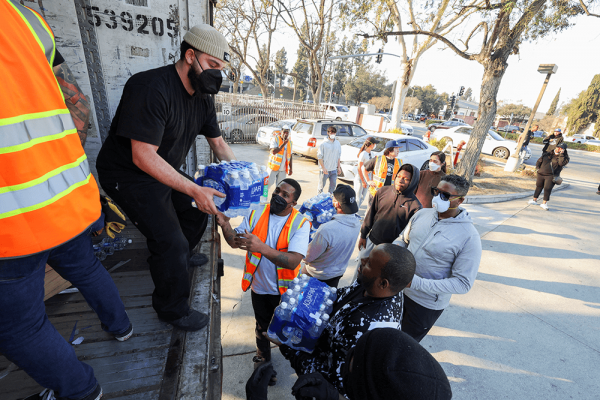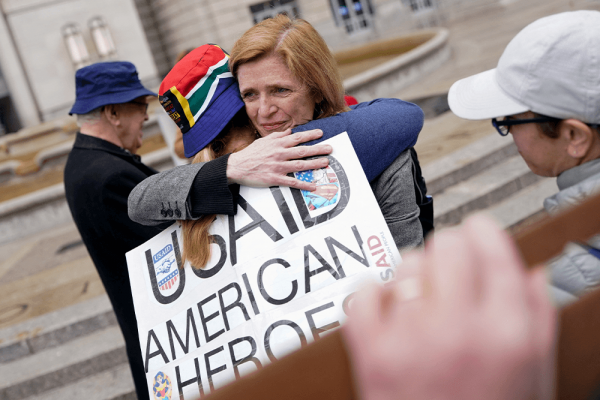Editor’s note: On May 3, 2021, after this article was published, President Joe Biden announced his administration would lift the refugee cap to 62,500.
Throughout his presidential campaign, Joe Biden said he would restore America’s role as a “leader" in refugee resettlement. And despite a discouraging start on fulfilling that promise, faith leaders and other advocates for refugees are determined to hold him to his commitment.
On April 16, President Joe Biden signed an emergency determination to speed refugee admissions to the U.S. while maintaining the historically low cap of 15,000 refugee admissions for the fiscal year. Hours later — after swift disappointment was expressed across political ideologies — White House press secretary Jen Psaki stated that “the President [will] set a final, increased refugee cap for the remainder of this fiscal year by May 15.”
Now, advocates for refugees — including many in the faith sector — are attempting to push the White House closer to Biden’s campaign promise that he would increase annual refugee admissions this year, and to eventually raise the cap — the maximum amount of refugees admitted — to 125,000.
Faith leaders applauded Biden’s decision to end the existing quotas on the number of refugees who can be resettled from certain countries and to allocate more refugee slots for countries in Africa, the Middle East, and Central America. President Donald Trump's refugee policy had restricted settlements from Somalia, Syria, and Yemen.
Despite seeing some good news, many faith leaders called Biden’s delay on raising the refugee ceiling an unacceptable letdown.
Elissa Diaz, policy and advocacy manager at Church World Service, a faith-based refugee resettlement agency and global humanitarian organization, told Sojourners that “the irreparable damage to the refugees who are waiting to be resettled and who were already approved for resettlement truly can’t be overstated.”
“It’s really important that we focus on the harm that’s caused by the delay to the refugees who remain in dangerous situations and to their loved ones who are in the U.S. waiting to be reunified,” Diaz said. She pointed out that the Biden administration has already worked with Congress to approve admitting 62,500 refugees in the current fiscal year, so there was “no reason for the delay.” Ultimately, Diaz and other advocates for refugees are pressing the administration to “honor its commitment, and change the admissions goal.”
Biden had previously criticized Trump’s historically low cap on admissions.
“Donald Trump has made clear that he does not believe our country should be a place of refuge,” Biden wrote on World Refugee Day in 2020. “This cannot stand,” Biden wrote, referencing the refugee cap that is currently still in place.
Currently, analysis shows that the U.S. is on pace to admit only 4,100 refugees during the 2021 fiscal year, which ends in September. That would be the lowest level in the U.S. refugee resettlement program’s history.
While some believe that the administration is delaying raising the ceiling due to political optics, Biden said at a press briefing that his administration “couldn’t do two things at once, but now we are going to increase the number.”
Amy Sullivan, a religion and politics journalist said Biden’s suggestion that the government can’t “chew gum and walk at the same time … is malarkey.”
“If this was a real commitment they had, they would announce that: ‘As soon as humanly possible, as soon as we can get that infrastructure in place, we absolutely want to see that number go back up to where it was at the end of the Obama admin,’” Sullivan said. “That is not what we are seeing.” (Sullivan is a member of Sojourners' board of directors.)
Sullivan isn’t alone in her criticism of the administration’s communication on refugee resettlement.
Throughout the Biden campaign, Refugee Council USA, which comprises 29 U.S.-based nongovernmental organizations, including Church World Service and Lutheran Immigration and Refugee Service, was in conversation via meetings and letters with the Biden-Harris team about the importance of dramatically raising the refugee ceiling. In the fall, refugee resettlement organizations said there seemed to be a true dialogue, and a firm commitment from the Biden campaign. Jessica Goudeau, an advocate for refugees and author of After the Last Border, confirmed this.
“I was in meetings in which [resettlement organizations] were begging the Biden campaign to ‘please communicate with us, please don’t leave us in the lurch, please don’t do again what the Trump administration did — which is not tell us what’s happening,’” Goudeau told Sojourners. “That communication was so eradicated under Trump, but we were hoping it would be better under Biden.”
When Biden took office, Goudeau said, resettlement organizations weren’t given a final number of how many refugees would be admitted in fiscal year 2021, or how much funding they would receive. Instead of a continued dialogue with the administration, she said “there was just radio silence for weeks.”
“If the administration had said, ‘It’s a lot worse than we thought. Can you just give us three months?’ refugee resettlement organizations would have responded with nothing but firm graciousness,” Goudeau said. “Instead, there was this huge lack of communication and then the administration unexpectedly lowered the numbers on a Friday afternoon when it was late in the news day. This is exactly what Trump used to do.”
It’s especially disappointing for the nine organizations, including Lutheran Immigration and Refugee Services, that contract with the State Department to resettle refugees in communities across the country.
Timothy Young, spokesperson for LIRS, said resettlement organizations “are ready to rise to the occasion” of welcoming refugees who have already been cleared by the State Department to enter the country. Rachel Pollock, director of Resettlement Service for the United States Conference of Catholic Bishops, said the same.
“We know that there are many refugees cleared for travel, some separated from their family,” Pollock wrote to Sojourners in an email. “We are a community that is willing and able to welcome our brothers and sisters in need.”
In anticipation of May 15, faith leaders, refugee advocates, and elected officials are pushing the administration toward higher admissions — and many of them believe Biden can be swayed by their advocacy.
We Welcome Refugees, a grassroots community of women who advocate for refugee resettlement, is collecting voicemails that implore Biden to raise the refugee ceiling and explain why the callers’ faith compels them to welcome refugees. They’re also collecting signatures on a petition with the same message.
“As followers of Jesus, it’s important that we prioritize vulnerable people,” Tess Clarke, director of We Welcome Refugees, told Sojourners.
Reps. Ilhan Omar (D-Minn.), Pramila Jayapal (D-Wash.), and Jan Schakowsky (D-Ill.), and others, issued a public letter urging Biden to “formalize the proposed revised FY21 refugee admissions goal of 62,500, restore regional allocations, and resume resettlement based on vulnerability.”
These advocates want elected officials and the public to remember that decisions about the number of admitted refugees involve real people with families, flights, and soon-to-expire medical checks.
“We have people who have been waiting years to be resettled and then they find out the day before, or the day of, that their travel is canceled,” Laura McCarter, refugee and immigration policy advisor for Bethany Christian Services, told Sojourners. “We want the administration to remember that these are lives on the line; these aren't just statistics that go up and down.”
For Clarke, she said her faith is helping her hold onto hope as May 15 approaches.
“We know we can rebuild the resettlement infrastructure together, but we need President Biden on our team,” Clarke said. “We thought he was going to be on our team. We’re still hoping he will be.”
Got something to say about what you're reading? We value your feedback!







